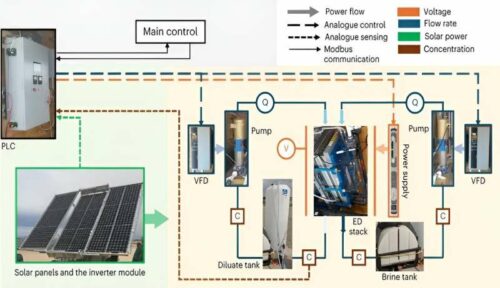This solar-powered system converts salt water into fresh drinking water and presents a cost-effective solution for rural areas, promising to address waterborne diseases and enhance agricultural sustainability.

Water stress affects approximately a quarter of the global population, with 1.6 billion people in rural areas facing water scarcity. In India, where 60% of land has saline water, efficient desalination methods are urgently needed. Traditional desalination technologies often rely on costly batteries or unreliable grid systems, limiting their accessibility in developing countries.
Scientists have unveiled a solar-powered system designed to convert saltwater into fresh drinking water, potentially reducing waterborne diseases like cholera. This new system,offers a more than 20% cost reduction compared to traditional methods and is suitable for deployment in rural areas worldwide. The technology, developed by researchers from King’s College London in collaboration with MIT and the Helmholtz Institute for Renewable Energy Systems, builds upon existing processes for converting saline groundwater to freshwater. By utilizing specialized membranes to separate salt ions from water, the system ensures consistent freshwater production using solar energy.
A key feature of the system is its adaptability to variable sunlight conditions, achieved by adjusting voltage and saltwater flow rates. Testing conducted in rural communities, such as Chelleru in India and replicated conditions in New Mexico, demonstrated the system’s capability to produce up to 10 m3 of fresh drinking water per day, enough for 3,000 people. The team emphasized the potential benefits for rural communities, citing increased water supply and associated health improvements. The system’s ability to operate off-grid offers a sustainable, cost-effective alternative for communities facing water scarcity and contamination. They highlighted the system’s affordability and sustainability, noting its potential for use beyond developing areas, including agriculture. The team plans to scale up the technology’s availability in India through local partnerships and establish a startup with MIT to commercialize the technology.
The system’s application in wastewater treatment and ocean alkalinity enhancement for CO2 absorption demonstrates its broader environmental and climate benefits. By providing a low-cost, energy-efficient solution, the technology has the potential to transform water access and agricultural practices, contributing to global sustainability efforts.
The post Solar-Powered Emission-Free Tech Turns Saltwater Into Drinking Water appeared first on Electronics For You.
View more at https://www.electronicsforu.com/news/solar-powered-emission-free-tech-turns-saltwater-into-drinking-water.
Credit- EFY. Distributed by Department of EEE, ADBU: https://tinyurl.com/eee-adbu
Curated by Jesif Ahmed